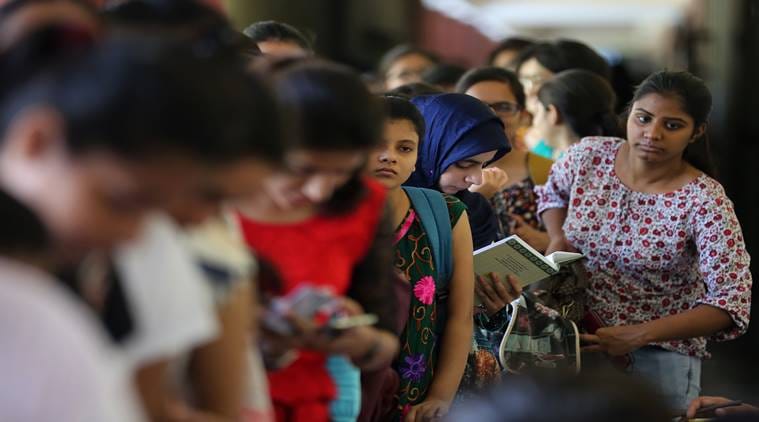
DU admissions 2019: The University of Delhi (DU) has released the syllabi and exam dates for the entrance test to be conducted for admission to the varsity undergraduate and postgraduate courses. As reported by the indianexpress.com first, the entrance exam will be conducted by the National Testing Agency (NTA) form this year onwards. As many as 9 undergraduates and almost all postgraduate courses.
While the entrance exams are scheduled to be conducted from June 30 to July 6, 2019 for various courses, the first cut-off list will be released from June 20. The second list is scheduled to be released on June 5 and third on June 29, 2019.
There are also many voices inside the varsity which do not want the exam to go online as they believe that it would be disadvantageous for students hailing from a rural and underprivileged background. Meanwhile, in-charge, admissions committee, Rajeev Gupta said, “Students will not have to face any issues, it will remain the same for them.”
View | How to apply for DU UG admissions 2019
Check detailed exam syllabus here:
Journalism: The only undergraduate course for which the entrance test will be conducted is BA Journalism. The test will be a multiple-choice question (MCQ) format of total 400 marks having 100 questions of four marks each. There will be a negative marking of one mark for each wrong answer. Students will be assessed over general knowledge, current affairs, and analytical and comprehension skills.
MA Hindi: Students will be asses on the basis of their knowledge of Hindi literature. Questions will be asked from Hindi language and culture heritage, literature, and modes and concepts of the language.
LIVE Updates: Delhi University admissions 2019
Indian languages: Several courses including MA Bengali, MA Tamil, MA comparative Indian Literature, MPhil comparative Indian literature, and PhD in modern Indian languages are being imparted by the Delhi University for all of these an entrance exam will be conducted and students need to study methodology, origin, literature, authors etc for the same.
MSC Biochemistry: The syllabus includes essential molecules of life, proteins and enzymes, metabolism of carbohydrates, lipids, amino acids and nucleotides, cell biology, membrane Biology and Bioenergetics Human Physiology and Hormones, gene organisation, replication, DNA repair, transcription and gene expression, concepts in genetics, genetic engineering and biotechnology, and immunology.
MA Punjabi: Punjabi culture and literature, advanced Punjabi conversation, Punjabi dramas and plays, modern age Punjabi poets, culture and heritage, literature, fair and festivals, Punjabi language, grammar and Gurmukhi.
MSc Mathematics: An MCQ-based test with 100 questions each for two hours duration will be conducted wherein candidates will be assessed on mathematical skills, mathematics education, general English language, reasoning and mental ability, and general awareness.
MA Japanese: Questions will be asked from grammar, Kani, vocabulary, expressions in Japanese language and general knowledge about Japan.
MA East Asian Studies: The exams will test the student on general knowledge, current affairs and knowledge of East Asia.
Read| DU to introduce 30 new courses, hike 282 seats across colleges
MA in lifelong learning: The test will consist of 100 objective type questions. The questions will be related to humanities, Social Sciences, Commerce general Science. Some questions will be related to programmes and Policies for Social Development, Education, Adult and Continuing Education. General information about the discipline of Adult Education and Lifelong Learning.
MA/MPhil/ PhD Political Science: Students will have to go through the syllabus for the course taught at the varsity and prepare likewise.
LLB: The test paper will consist of one question paper containing 100 objective-type questions with multiple choice answers relating to English language comprehension, analytical abilities, legal awareness and aptitude, and general knowledge.
LLM: The test shall be of two hours duration and the paper will consist of one question paper containing 100 objective-type questions with multiple choice answers relating to Constitutional Law of India, Jurisprudence, Law of Contracts, Sale of Goods, Law of Torts, Consumer Protection, Criminal Law, Family Law, Public International Law, Intellectual Property Law, Cyber Law, Environment Law, Company Law and Partnership. In addition, a few questions may address the contemporary legal issue.
PhD law: The Test shall be of two hours duration. The test paper shall consist of 50 objective type questions. The language of the entrance test shall be English. The syllabus for the entrance test will consist of 50% questions on research aptitude/methodology and 50% subject-specific questions.
MA Philosophy: Students need to check previous year question papers and syllabus of the course to prepare for the test.
Other undergraduate courses that will enrol students based on entrance exams are BA (hons) Business Economics, BMS, BBA financial investment analysis, BTech (IT and mathematical innovations), BA humanities and social science, Bachelor of Elementary Education, BSc physical education, and sports, BA (honours) multimedia and mass communication, five-year integrated programme in journalism.